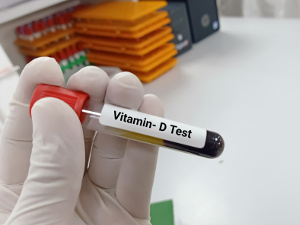Vitamin D supplements lower the need for opioids in palliative cancer care
 Cancer patients often have overwhelming pain that turns up as their disease progresses. The whole purpose with palliative care is to relieve the pain, and opioids such as morphine are often used for this purpose. However, according to a Swedish study published in the science journal Cancer, more and more terminal cancer patients who are given high-dosed supplements of vitamin D have less need for pain treatment and generally feel less tired. Vitamin D deficiencies are common among cancer patients and may contribute to a shorter life expectancy.
Cancer patients often have overwhelming pain that turns up as their disease progresses. The whole purpose with palliative care is to relieve the pain, and opioids such as morphine are often used for this purpose. However, according to a Swedish study published in the science journal Cancer, more and more terminal cancer patients who are given high-dosed supplements of vitamin D have less need for pain treatment and generally feel less tired. Vitamin D deficiencies are common among cancer patients and may contribute to a shorter life expectancy.
Opioids such as morphine have a pain-relieving effect when they bind to opioid receptors in the central nervous system, among other places. We are also affected psychologically when we become euphoric, relaxed, or sedated. Even short-term use of opioids may cause addiction with a need for more. Used in extremely high doses, opioids may cause death by asphyxiation because it brings the respiratory system to a halt.
|
Vitamin D, cancer, and palliative care
Vitamin D is important for our bone health and immune defense. It is also considered a neuroactive steroid hormone with importance for our brain, nervous system, and mood. It is commonly known that cancer patients in their palliative care phase lack vitamin D. Earlier studies have even shown that low levels of the nutrient in the blood are linked to pain, increased risk of infection, fatigue, depression, and reduced quality of life.
A small, non-placebo-controlled study of terminal cancer patients suggests that supplements of vitamin D may increase quality of life and lower the need for opioids and antibiotics. Scientists at Karolinska Institutet at Stockholm University therefore wanted to look closer at the effect of vitamin D supplements given to cancer patients in palliative care in a large, randomized, placebo-controlled setting.
A total of 244 terminally ill cancer patients – all in palliative care – took part in the study. At baseline, they all lacked vitamin D. The patients were either given 100 micrograms of vitamin D daily or matching placebo. This dose is relatively high compared with the threshold value that has been established by the European Food Safety Authority (EFSA).
The scientists then measured any changes in the patients’ need for opioids, which gave an indication of their pain level. These measurements were made after 4, 8, and 12 weeks.
According to the study, the patients that got vitamin D consumed significantly lower amounts of opioids as compared to the placebo group.
In addition, the patients in the vitamin D group suffered less from cancer-related fatigue. On the other hand, there was no difference between the two groups in terms of quality of life and their need for antibiotics.
According to the scientists, this is the first randomized, placebo-controlled study to show the effect of vitamin D supplementation on cancer patients in palliative care, at least with regard to pain reduction and fatigue. All the patients tolerated the large vitamin D quantities rather well.
There was one weakness with this study, however: Only 150 out of the 244 patients were able to complete the full 12 weeks of taking vitamin D or placebo, simply because they were terminally ill and several patients died along the way.
The new Swedish study is published in the science journal Cancer.
Just for the record, earlier studies have shown that lack of vitamin D can increase the need for opioids in connection with other types of pain therapy and in substance abuse, and vitamin D supplements may even be relevant as an adjuvant.
Increased focus on vitamin D-deficient cancer patients
As mentioned, lack of vitamin D is more common among cancer patients and that is linked to a variety of factors such as: spending much time indoor, prolonged hospitalization, avoidance of sunlight following radiation therapy and chemotherapy, and impaired nutritional status due to lack of appetite. Severe lack of vitamin D is even one of the reasons why critically ill cancer patients are admitted to the intensive care unit and die within a year. Therefore, cancer patients who have been discharged from intensive care may benefit from taking a vitamin D supplement, according to an Austrian study published in Nutrients. This study supports earlier studies, according to which vitamin D has several anti-cancer mechanisms. It is important to get plenty of vitamin D every day throughout life.
References:
Maria Helde Frankling et al. ´Palliative-D´-Vitamin Supplementation to Palliative Cancer Patients: A Double Blind, Randomized Placebo-Controlled Multicenter Trial, Cancers 2021
Karolinska Institutet. Vitamin D reduces the need for opioids in palliative cancer patients. ScienceDaily. August 5, 2021
Lajos V. Kemény et al. Vitamin D deficiency exacerbates UV/endorphin and opioid addiction. Science Advances, 2021
U.S. Department of Health and Human Services. What is the U.S. Opioid Epidemic? 2021
Nina Buchtele et al. Prevalence and Impact of Vitamin D Deficiency in Critically Ill Cancer Patients Admitted to the Intensive Care Unit. Nutrients 2021
Nikki Hancocks. Study puts cancer patient vitamin D deficiency under the spotlight. NUTRAingredients.com 2021
Paulette D Chandler et al. Effect of Vitamin D3 Supplements on Development of Advanced Cancer. JAMA 2020
https://www.foedevarestyrelsen.dk/Nyheder/Aktuelt/Sider/Pressemeddelelser%202020/Nye-D-vitamin-anbefalinger-til-b%C3%B8rn-og-voksne.aspx
Search for more information...
- Created on .








